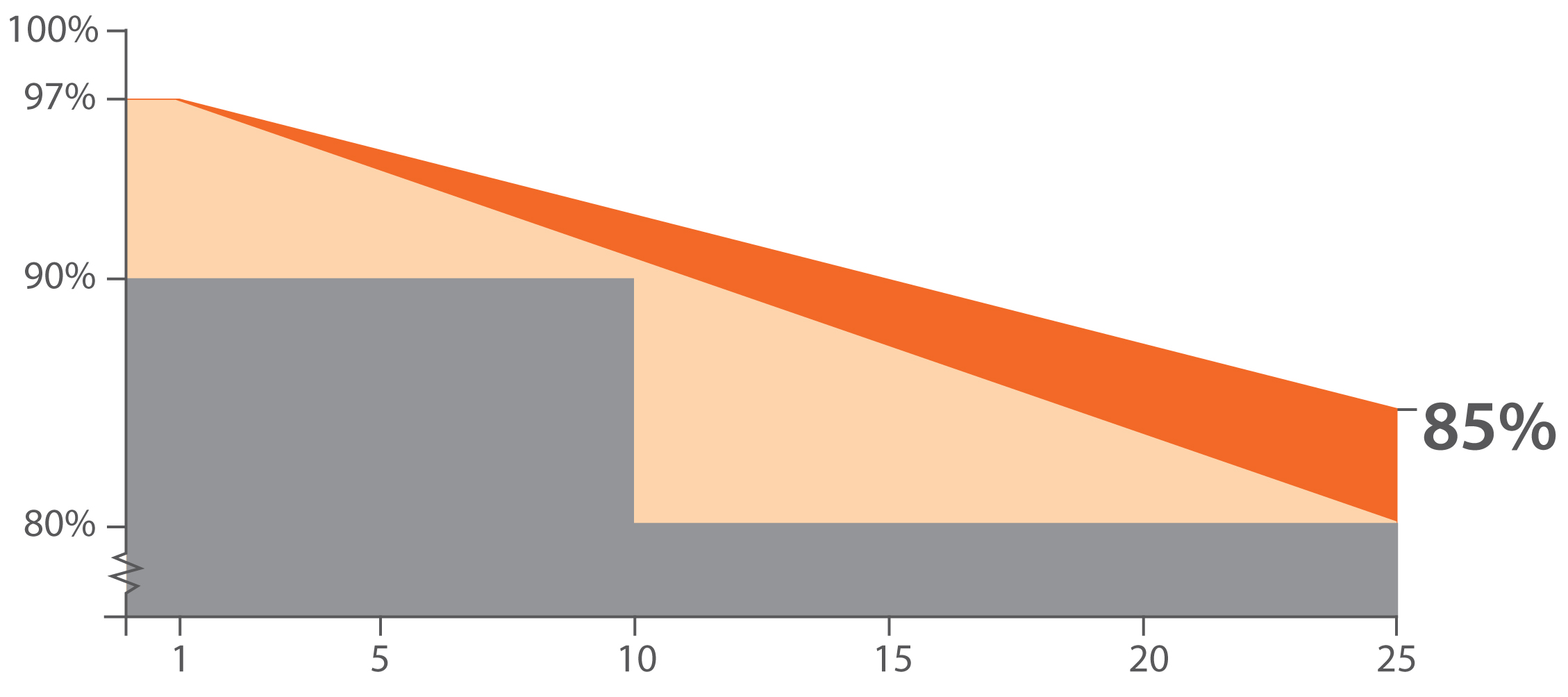Solar panels typically require little maintenance and are said to last an average of 25 to 30 years, according to manufacturers. But there are a few simple steps you can take to keep your panels running at full capacity for longer than warranted and industry average. Let’s consider them.
10 steps to extend the life of solar panels
- To increase the life cycle of solar panels , it is important to choose a qualified installer who will offer reliable customer service.
- Opt for panels that have strong warranties on both product/equipment and performance/efficiency. This will allow you to request a replacement in case of any defects after several years of installation.
- Choose a manufacturer with a good reputation. Study preliminary information about how long the manufacturer has been on the market, how it provides quality control and a guarantee for its product, what technologies it uses, read customer reviews. Solar panels are predominantly encased in glass and are virtually unaffected by the environment. The semiconductor material is usually insulated from aggressive atmospheres. If a manufacturer uses non-standard materials to encapsulate metallic and conductive materials, this can sometimes cause the panel to fail earlier.
- Make sure the solar panels have full access to the light. Remove any tree branches or other plants that block sunlight. Any shading will have a negative effect on the efficiency of the solar panel also because the shaded area will become a “hot spot” with high resistance. Such “hot spots” can accelerate the degradation of the module over time and lead to premature failure of the module.
- Be sure to keep your solar panels clean. Panels need to be cleaned 1-2 times a year. In areas where there are frequent strong winds or snowfalls, this will need to be done more often, as needed. Panels must be free of dust, dirt, sand, nests and bird and animal debris. In cities with high levels of air pollution, do not allow smog to settle on the panels. In winter, if possible, prevent the panels from icing and clean them from snow in a timely manner. As practice shows, cleaning requirements for small systems can be minimal. For example, panels installed at an angle of 5 to 10 degrees from the horizontal do not require frequent special cleaning – regular rains are enough for them. In colder climates, steep panel angles also allow snow to slide off faster. But if the panels are installed horizontally, then they will have to be cleaned regularly. As, however, in the case of a long absence of precipitation, a heavy layer of dust from construction work, a sandstorm, or if dirt or massive and uneven dirt is visible on the surface of the panel.
- When buying and installing solar panels , keep in mind that the degree of degradation is partly determined by the type and quality of the solar panels in the panel. For example, thin-film panels degrade several times faster than crystalline ones.
- Keep in mind that the solar panels themselves are likely to be the most resilient and reliable part of your solar system. But inverters and batteries will have to be regularly serviced and periodically replaced so that everything works smoothly. This will incur additional costs, so factor them into your budget.
- Some design options, such as premium finishes, can help extend the life of your solar panels. It can prevent the entry of water vapor and other contaminants that cause corrosion, make it difficult for light to enter, and thus hinder power generation. For the same reason, panel failure rates will be lower if electrical, thermal, and other moisture barriers are built together inside the panel. Another feature that affects the life of the panel is the high-quality anti-reflective coating that protects the solar cells and increases the efficiency of the panels.
- Incorrect installation can shorten the life of the panels, for example, if the panels are not connected correctly or damaged during installation. Problems resulting from improper installation are usually covered by the build quality warranty.
- Monitor the operation of your solar power plant and perform regular scheduled maintenance. This will help keep your solar panel, meters and other system components running at peak efficiency.
So, the best way to increase the life of your panels is to work with a reputable installer who offers reliable customer service. It is also important to purchase solar panels with solid warranties – many panel manufacturers offer 10 to 12 year hardware warranties for their panels that cover defects, as well as 25 to 30 year performance warranties. And do not forget to control the process of operation of the entire installation, observing the rules of its operation. If you follow the above rules, you will be able to enjoy the efficient operation of your solar installation for a long time and receive environmentally friendly and inexpensive energy for your needs.
